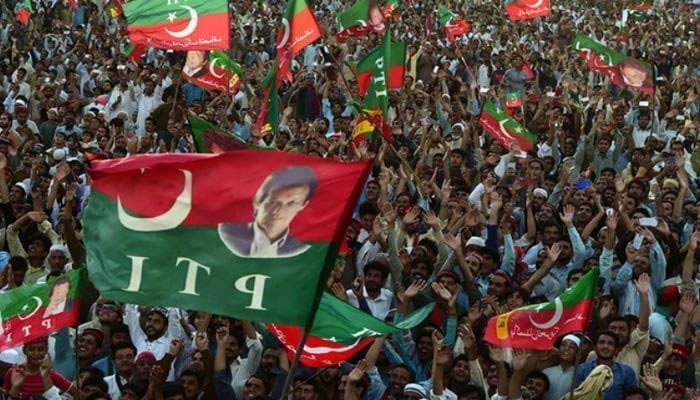Leaping without a safety net
Imran Khan asks supporters to converge on Islamabad on November 24, calling it “final call” to oppose govt
The PTI has once again sounded the call to rally. But this time, with PTI founder Imran Khan behind bars, the stakes feel higher, the logistics messier, and the vision murkier. Imran Khan has asked his supporters to converge on Islamabad on November 24, calling it the “final call” to oppose the government. The question is, what happens if this ‘final call’ falls flat? We’ll be back to yet another final fall for a final call? Despite Imran’s confidence, his supporters might be grappling with the realities of rallying without a clear directive. A report in this newspaper has suggested that several key PTI figures are already hesitant about this sudden push, fearing the logistical nightmares and the potential fallout of an underwhelming turnout. They’re not wrong. Historically, the PTI’s leadership has struggled to sustain large-scale mobilisations, often fizzling out after initial surges. With Imran Khan in jail, his charismatic hold over crowds weakened, and the organisers fearing arrests, the fact is that this ‘final call’ appears poorly timed and poorly planned.
Imran Khan’s demands – revoking the 26th Amendment, restoring democracy, returning the public’s mandate, and releasing political prisoners – are bold but eventually impractical. Aside from the call to release prisoners, his demands read like a wish list that doesn’t account for the complex reality of Pakistan’s political structure. The government, far from bending to these ultimatums, is more likely to use the situation to showcase the PTI’s organisational weaknesses and lack of foresight. Even the strategy of concealing the organisers’ identities speaks to a party unsure of how to secure its footing in the current political climate. In Punjab, where Imran Khan’s following is strongest, the government will likely put up significant roadblocks to prevent a mass movement into Islamabad. But the challenge lies not just in navigating the government’s roadblocks but in contending with the internal divisions and hesitation within the party’s own ranks. With Imran behind bars and no definitive successor or clear chain of command, the PTI is quickly sliding into a vacuum of leadership. The whispers that Imran’s family members could step up to lead the march further illustrate the PTI’s lack of a cohesive game plan. Even if they were to join, the lack of an official role or directive could only lead to a show of solidarity rather than a transformative force.
This march has the makings of a high-stakes spectacle that could backfire and the PTI seems to be risking an embarrassment that could empower the government and dampen the spirits of its supporters. A protest of this magnitude, with such high expectations, cannot be called off without some form of meaningful concession. If the PTI folds without achieving anything, the ‘final call’ might become its final misstep. Instead of pressuring the government, the party risks exposing its own organisational fragility and the diminishing influence of its jailed leader. Without a clear strategy or realistic demands, the PTI’s march might ultimately serve as little more than a rallying cry into the void – loud, emotional, but ultimately futile. For the party, the choice is stark: strategise wisely and take tangible steps to fortify its presence, or risk becoming its own worst enemy.
-
 Jesy Nelson Reflects On Leaving Girls' Band Little Mix
Jesy Nelson Reflects On Leaving Girls' Band Little Mix -
 World’s First Pokemon Theme Park Opens In Tokyo, Boosts Japan Tourism
World’s First Pokemon Theme Park Opens In Tokyo, Boosts Japan Tourism -
 Waymo Trains Robotaxis In Virtual Cities Using DeepMind’s Genie 3
Waymo Trains Robotaxis In Virtual Cities Using DeepMind’s Genie 3 -
 5 Simple Rules To Follow For Smooth, Healthy Hair
5 Simple Rules To Follow For Smooth, Healthy Hair -
 $44 Billion Bitcoin Blunder: Bithumb Exchange Apologizes For Accidental Payout
$44 Billion Bitcoin Blunder: Bithumb Exchange Apologizes For Accidental Payout -
 Katie Price Ends Public Feud With Ex Peter Andre After 16 Years
Katie Price Ends Public Feud With Ex Peter Andre After 16 Years -
 Apple May Bring ChatGPT And Other AI Apps To CarPlay
Apple May Bring ChatGPT And Other AI Apps To CarPlay -
 Meghan Markle, Prince Harry Likely To Attend Super Bowl Halftime Show 2026
Meghan Markle, Prince Harry Likely To Attend Super Bowl Halftime Show 2026 -
 AI Next Big Trial: Elon Musk Calls For ‘Galileo Test’ To Prove True Intelligence
AI Next Big Trial: Elon Musk Calls For ‘Galileo Test’ To Prove True Intelligence -
 US Appeals Court Affirms Trump’s Immigration Detention Policy
US Appeals Court Affirms Trump’s Immigration Detention Policy -
 Bella Hadid, Adan Banuelos Rekindle Romance After Brief Separation
Bella Hadid, Adan Banuelos Rekindle Romance After Brief Separation -
 Jay-Z Shares Bold Advice With Bad Bunny For NFL Super Bowl Halftime Show Appearance
Jay-Z Shares Bold Advice With Bad Bunny For NFL Super Bowl Halftime Show Appearance -
 Epstein Probe: Bill, Hillary Clinton Call For Public Testimony Hearing
Epstein Probe: Bill, Hillary Clinton Call For Public Testimony Hearing -
 Brooklyn Beckham Considers Adoption As Nicola Peltz Can't Carry A Baby
Brooklyn Beckham Considers Adoption As Nicola Peltz Can't Carry A Baby -
 Expert Discusses 'complications' Of Measles Outbreak
Expert Discusses 'complications' Of Measles Outbreak -
 Kaley Cuoco Recalls Her Divorce With Karl Cook: 'I Was Gonna Die'
Kaley Cuoco Recalls Her Divorce With Karl Cook: 'I Was Gonna Die'




